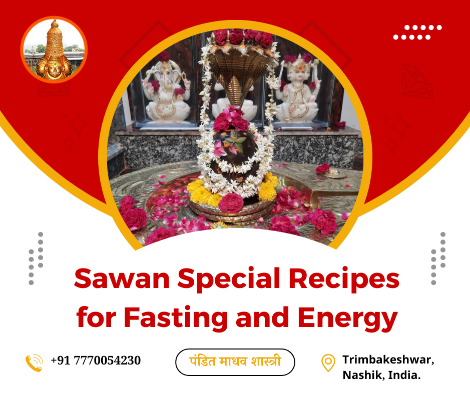
- January 1, 2025
- Pandit Madhav Shastri
- 0
Sawan Special Recipes for Fasting and Energy
Introduction: Nourishment with Devotion
The holy month of Sawan is a period of deep devotion and spiritual cleansing. During this time, devotees of Lord Shiva observe fasts, perform rituals, and engage in introspection. However, with restricted food intake, maintaining energy levels becomes a challenge. Hence, selecting the right recipes not only ensures adherence to religious customs but also promotes physical well-being.
This blog explores nutritious and sattvic recipes specially curated for Sawan fasts. Each dish is simple, quick to prepare, and designed to boost energy without breaking the sanctity of the fast.
Why Choose Special Recipes During Sawan?
Fasting can be physically draining if one is not mindful of nutritional balance. Moreover, the food consumed must adhere to spiritual guidelines, avoiding items like grains, pulses, onion, garlic, and regular salt.
Instead, ingredients such as:
Sendha namak (rock salt)
Sabudana (tapioca pearls)
Makhana (fox nuts)
Kuttu (buckwheat flour)
Singhara (water chestnut flour)
Potatoes, sweet potatoes, fruits, and dairy
…are considered ideal for vrat meals.
So how can one cook delicious yet energizing food using these? Let’s explore.
1. Sabudana Khichdi
Ingredients:
1 cup sabudana (soaked overnight)
2 boiled potatoes
1/2 cup peanuts
2 tbsp ghee
Sendha namak to taste
Green chilies, chopped
Cumin seeds (jeera)
Curry leaves (optional)
Method:
Heat ghee, add cumin and green chilies.
Add boiled potatoes, sauté.
Add soaked sabudana, peanuts, and salt.
Cook until translucent. Garnish with coriander.
Energy Tip: Sabudana is high in carbohydrates, making it perfect for maintaining energy during fasts.
2. Kuttu ki Poori
Ingredients:
1 cup kuttu flour
2 boiled potatoes (mashed)
Sendha namak
Green chilies and coriander
Ghee or oil for frying
Method:
Mix flour, potatoes, salt, and chilies.
Knead into dough using minimal water.
Roll and deep fry into pooris.
FAQ: Can I substitute kuttu flour with singhara flour? Answer: Yes, you can replace or mix both for varied texture.
3. Makhana Kheer
Ingredients:
1 cup makhana
500 ml milk
4 tbsp sugar or jaggery
Cardamom, saffron
Dry fruits
Method:
Roast makhana in ghee.
Boil milk and add roasted makhana.
Add sugar and simmer.
Add cardamom and dry fruits.
Spiritual Note: This sattvic dessert is perfect as a light, energy-filled offering to Lord Shiva.
4. Lauki (Bottle Gourd) Thepla
Ingredients:
1 cup lauki (grated and squeezed)
1 cup kuttu or singhara flour
Green chili, coriander
Sendha namak
Method:
Mix all ingredients to form soft dough.
Roll and roast on tawa with ghee.
Serve with yogurt or vrat chutney.
Energy Tip: Lauki cools the system and prevents acidity during fasting.
5. Vrat Wale Aloo
Ingredients:
Boiled potatoes
Cumin seeds
Ghee
Green chili
Rock salt
Method:
Heat ghee, add jeera and chili.
Add potatoes and salt.
Sauté until golden brown.
Quick Tip: Add lemon juice for taste and digestive ease.
6. Fruit and Dry Fruit Chaat
Ingredients:
Banana, apple, pomegranate
Chopped dates, raisins, almonds
Sendha namak
Lemon juice
Mint leaves (optional)
Method:
Chop all fruits.
Add dry fruits, salt, lemon juice.
Mix gently and serve chilled.
Why It Works: Fruits hydrate and provide instant energy. It’s also a good morning or evening option.
7. Singhara Chilla (Pancake)
Ingredients:
1 cup singhara atta
Water (to make batter)
Green chili, coriander
Sendha namak
Method:
Make a smooth batter.
Pour on hot tawa, spread like dosa.
Roast both sides with ghee.
Health Note: Singhara is gluten-free and cools the body.
8. Sama Rice Pulao (Vrat Ke Chawal)
Ingredients:
1 cup sama ke chawal
Boiled potatoes
Cumin seeds, ghee
Peanuts
Method:
Heat ghee, add jeera and peanuts.
Add potatoes, then sama rice.
Add water, salt and cook till done.
Energy Note: Sama rice is rich in fiber and easy to digest.
9. Sweet Potato Tikki
Ingredients:
2 sweet potatoes (boiled)
Sendha namak
Green chili, coriander
Roasted peanut powder (optional)
Method:
Mash and mix all ingredients.
Shape into tikkis.
Shallow fry till crisp.
Why Add: Sweet potatoes are naturally sweet, high in fiber, and provide sustained energy.
10. Coconut Ladoo (No Sugar)
Ingredients:
2 cups grated coconut
1 cup condensed milk or jaggery
Cardamom powder
Method:
Roast coconut lightly.
Add condensed milk.
Cook till it binds.
Roll into laddoos.
Devotional Connection: Offer to Lord Shiva as naivedyam before consuming.
Additional Tips for Healthy Fasting
Drink plenty of fluids: coconut water, lemon water, buttermilk
Avoid deep-frying frequently
Prefer ghee over refined oils
Maintain fixed meal timings
Break fast slowly with light fruits or fluids
Common FAQs
Q1. Can I drink tea during Sawan fast? Yes, but avoid adding processed sugar or milk in excess.
Q2. Is it okay to skip meals during fasting? Skipping can lead to fatigue. Have small portions of sattvic food.
Q3. Can children or elderly follow these vrat recipes? Yes, but tailor the spice level and portion sizes accordingly.
Q4. How many meals can one eat during fast? Traditionally one or two light sattvic meals are allowed.
Q5. Can these recipes be consumed even when not fasting? Absolutely! They are healthy, light, and perfect for detox too.
Conclusion: Fasting with Flavor and Balance
Fasting during Sawan is not about starving but about spiritual alignment and bodily purification. With mindful recipes, it becomes a celebration of devotion and health. Each dish above blends traditional values with modern nutrition, ensuring you remain energized and spiritually elevated.
So this Sawan, fast wisely, eat mindfully, and connect deeply with Lord Shiva through purity in food and thought.
